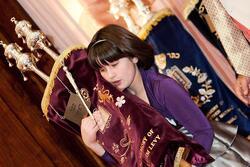Leining: A Balancing Act
Torah scroll. Via Pixabay.
Before I turned twelve, I never questioned my ability to read Torah. Until I was six, I regularly attended a partnership minyan in my neighborhood where I was surrounded by both women and men leading services and reading Torah. There, almost every child, regardless of gender, learned and read Torah to celebrate their B’nai Mitzvah. When I was in kindergarten, my family moved to a nearby city and we started almost exclusively attending an Orthodox shul where women could not read Torah in the main service. Despite this change, my confidence about reading Torah did not waver.
About two years before my Bat Mitzvah, I began learning how to lein (chant Torah). I had weekly lessons with a family friend and planned to read my entire parsha, as well as the Haftorah portion, in the women’s tefillah group at my shul to celebrate becoming a Bat Mitzvah. As I made progress with my leining, my friends from my Modern Orthodox school were also preparing for their Bat Mitzvahs. Through conversations about our different Bat Mitzvah plans, I gradually realized that I was going to be the only girl in my grade reading Torah as part of my Bat Mitzvah celebration. It didn’t bother me too much, though; by the time I finally realized, I had already put in so much work that I wasn’t willing to throw it all away. Since, thankfully, my Torah reading did not elicit any negative reactions from my friends at school, I didn’t want to disappoint family and friends just to conform to my school’s gendered social norm.
When the day of my Bat Mitzvah finally arrived, I could not have been more eager. I felt confident after the final run-through of my parsha the night before and supported by the family and friends surrounding me. I smoothly read my parsha and Haftorah in women’s tefillah, and then delivered a speech to the whole congregation at my shul. After showing off what I had worked on for so long, I felt a weight lifted off my shoulders. But a cloud of doubt also crossed my mind. What was I supposed to do with the skills I had gained over almost two years of learning to lein? Surely, my countless hours of preparation wouldn’t be forgotten after a single morning. I hoped my efforts would culminate into something more meaningful than just a party trick.
In the months that followed my Bat Mitzvah I practically didn’t lein at all. My school doesn’t offer a venue for girls to read Torah and my shul’s women’s tefillah does not regularly meet for Shabbat shacharit. My only opportunity to lein at home was at my shul’s women’s tefillah mincha services, and I have never felt particularly compelled to attend or participate in those services.
However, since my Bat Mitzvah, I have been able to utilize my Torah reading ability away from home when my family attends a partnership minyan in New York. In New York, I feel comfortable owning my leining and I step up to read Torah multiple times a year. There, leining doesn’t “other” me. Instead, the skill helps me fit in as a contributing member of the greater community.
In February, I went to Israel for the final round of the Ulpaniada, a math competition for Orthodox girls sponsored by the Israeli Ministry of Education and hosted by Michlalah College in Jerusalem. Before leaving, I bought clothes that covered my knees, elbows, and collarbone; these were body parts that I was forbidden from showing according to the strict dress code emailed to me weeks before my departure. When I arrived at Michlalah, there was not a single female elbow or knee in sight. While I had an incredible and meaningful trip to Israel, I felt suffocated by the clothing I was forced to wear for the portion of the trip organized by Michlalah. If I wasn’t allowed to reveal my elbows, I couldn’t imagine how frowned upon revealing my ability to lein would be. The irony wasn’t lost on me. Here I was at a competition celebrating young Jewish women’s intellect and an important, intellectual part of my Jewish identity was being completely smothered.
Existing at the border between modern and traditional values often feels like teetering across a balance beam. I occasionally manage to regain my balance by leining and flaunting my Jewish identity. I discover pockets of space where I can contribute with my full capabilities and have room to blossom and develop my Jewish identity. Still, at times I feel as if I’m losing my balance and falling because critical parts of my Jewish identity are being stifled and forbidden from shining through.
This piece was written as part of JWA’s Rising Voices Fellowship.







You explained this so articulately. Thank you for sharing, I loved it!
This is very interesting! I, personally, thinks there's something very special about women chanting Torah... I hope you find more outlets to do this as you learn and grow.